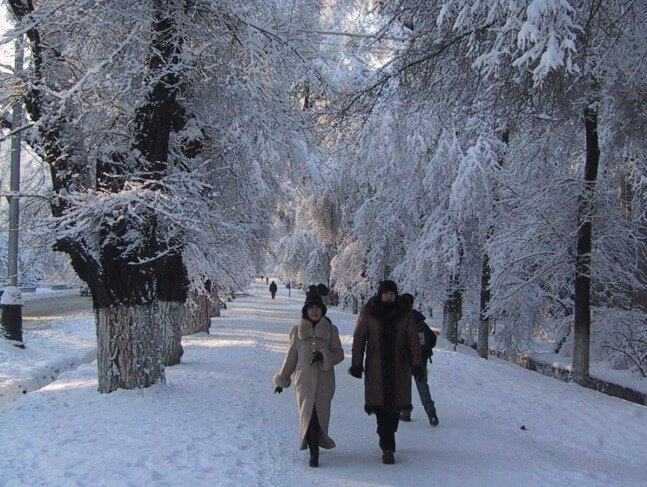Prevention of Influenza and Diseases in the Cold Winter
Prevention of Influenza and Diseases in the Cold Winter
Preventing Illnesses in Cold Winter
Winter, with its harsh cold, is a season when the likelihood of contracting various types of influenza and respiratory illnesses increases. This change in weather can negatively impact our health, making it essential to take effective steps to strengthen our immune system.
There are many ways to achieve this, such as following a healthy diet, exercising regularly, and consuming natural juices rich in Vitamin C. In this article, we will explore practical tips for preventing illnesses during the cold winter months, wishing you health and safety.

Tips to Avoid Winter Illnesses
Influenza
The influenza virus poses a significant risk, especially for individuals with weakened immune systems, such as those suffering from chronic diseases like diabetes and kidney conditions, or seniors over sixty years old. Influenza can lead to serious complications, such as pneumonia, which can be life-threatening.
Tip: Getting the annual influenza vaccine is crucial. This vaccine helps reduce the risk of infection and its spread, and is particularly necessary for the health of seniors and those with chronic illnesses. It’s also advisable to stay updated on local health campaigns regarding vaccination, as recommendations may change annually based on virus prevalence. Additionally, try to avoid large gatherings whenever possible, especially during peak flu season.
Common Cold
The common cold is a widespread condition that often flares up during winter, typically caused by viruses. Symptoms like a runny nose, sneezing, and coughing can be quite bothersome. Therefore, it is essential to adopt multiple preventive measures to avoid infection.
Tip: To maintain good hygiene, wash your hands frequently with soap and water, especially after returning home or touching public surfaces. Hand sanitizers can be a good alternative when soap and water are unavailable. If a family member is sick, pay attention to the cleanliness of dishes and utensils used.
It’s advisable to use disinfectants to clean surfaces where the virus may linger, helping to prevent its transmission to other family members. Additionally, bolstering the immune system by consuming vitamin-rich foods, such as fruits and vegetables, and considering nutritional supplements can also be beneficial.
Sore Throat
Sore throat is another common ailment during winter, often resulting from viral infections. Studies indicate that temperature fluctuations, such as moving from a warm environment to a cold one, can impact throat health and lead to symptoms.
Tip: If you experience a sore throat, gargling with warm salt water for three minutes can be helpful. While this method won’t cure the condition entirely, it can alleviate inflammation and provide comfort. Drinking warm beverages like honey tea is also effective for soothing the throat. It’s advisable to avoid spicy or acidic foods that may irritate the throat further. Adequate rest is crucial for recovery, as the body requires energy to fight off infections.
Joint Pain
Joint pain is prevalent among individuals with rheumatism, especially during cold winters. The cold weather can lead to muscle stiffness and increased pain sensations. Although the exact reason behind this phenomenon remains unclear, many individuals feel their joint pain intensifies in winter.
Tip: Regular exercise is recommended to improve both physical and mental health. Swimming is particularly beneficial for alleviating joint pain, as it promotes movement and reduces stress. Consulting a healthcare professional to identify suitable exercises for each case is also essential. Additionally, using heat therapies, such as warm compresses, can help ease discomfort. Consuming foods rich in omega-3 fatty acids, like fish and nuts, can also be beneficial in reducing inflammation.
Asthma
Cold air is one of the primary triggers for asthma attacks and symptoms, such as shortness of breath and coughing. Therefore, asthma patients need to exercise great caution during the winter months. Sudden temperature changes can irritate the airways, worsening symptoms, particularly in sensitive individuals.
Tip: Asthma patients should remain indoors during severe cold spells. For those needing to go outside, wearing a mask over the mouth and nose or wrapping a scarf around the face is advisable. It’s also crucial to adhere to prescribed medications and ensure that inhalers are readily available. Practicing deep breathing techniques can help alleviate symptoms, as well as avoiding strenuous physical activity in cold weather.
Dry Skin
As winter approaches, many people suffer from dry skin, a condition that worsens due to lower humidity levels. Dryness can affect the skin’s appearance and make it more susceptible to cracking and irritation. It is essential to keep the body hydrated consistently, especially after showering and before bedtime, to ensure healthy skin.
Tip: Opt for natural moisturizers such as almond oil and natural soap to hydrate the skin, and avoid using hot water during showers, as it can lead to dryness and irritation. Drinking adequate amounts of water is also crucial for internal hydration. Using a moisturizer immediately after bathing can help lock in moisture. Additionally, products containing glycerin or aloe vera are effective for maintaining skin hydration.
Chest Pain
According to reports from the World Health Organization, chest pain is more common during winter. This may be due to high blood pressure caused by cold weather or sudden changes in temperature between indoors and outdoors. This situation places additional stress on the heart.
Tip: Individuals at risk for heart disease should stay indoors during severe cold and storms, maintaining a comfortable indoor temperature. When going outside, wearing a hat and gloves is essential to keep the body warm. It’s also critical to avoid excessive stress and strain, as these factors can negatively impact heart health. Monitoring any unusual symptoms, such as chest pain or shortness of breath, and consulting a healthcare provider if they occur is essential.

General Tips for Boosting Immunity
1. Balanced Diet
Eating a variety of foods rich in vitamins and minerals enhances immune function. It is recommended to consume fresh fruits and vegetables, especially those high in Vitamin C, such as oranges and red peppers. Garlic is also beneficial for fighting off illnesses due to its antibacterial and antiviral properties. Including healthy proteins like fish, chicken, and lentils in the diet is essential for strengthening immunity.
2. Regular Exercise
Physical activity is an effective way to boost immunity. It is recommended to engage in at least 30 minutes of exercise most days of the week. Activities can include walking, running, or even yoga, which help improve circulation and reduce stress. Always choose activities that match your fitness level to avoid injuries. Joining sports groups can also enhance motivation and enjoyment.
3. Quality Sleep
Getting enough sleep is vital for strengthening the immune system. Aim for 7 to 9 hours of sleep each night, as quality sleep enhances the body’s ability to combat infections. Establishing a regular sleep routine, such as going to bed at the same time each night and avoiding screens before sleep, can facilitate entering deep sleep.
4. Stress Management
Managing stress is crucial for maintaining a healthy immune system. Engage in relaxation techniques such as meditation or yoga to improve mental health. Participating in recreational activities and hobbies can also help reduce stress levels, contributing to an overall better mood. Additionally, maintaining social connections with friends and family provides emotional support, which is effective in alleviating stress.
5. Hydration
Staying hydrated by drinking adequate amounts of water is essential for maintaining bodily functions and supporting the immune system. Aim for at least 8 cups of water daily, particularly during winter when the body may be more prone to dehydration. Warm fluids like herbal teas or soups can also contribute to hydration.
6. Avoiding Smoking and Alcohol
Smoking negatively impacts respiratory health and increases the risk of illnesses. It is advisable to avoid both smoking and alcohol, as they can weaken the immune system. Seeking support when trying to quit these habits, such as joining support groups or consulting professionals, can be highly beneficial.
7. Sun Exposure
Sunlight is a crucial source of Vitamin D, which plays a significant role in strengthening the immune system. Aim to expose yourself to sunlight for 15-30 minutes daily, especially during the morning or late afternoon. On cold winter days, using Vitamin D supplements can help compensate for deficiencies.

Conclusion
Strengthening the immune system and preventing illnesses during winter requires ongoing effort and adherence to a healthy lifestyle. By taking simple steps, such as maintaining hygiene, obtaining necessary vaccinations, and engaging in physical activity, the risk of various illnesses can be significantly reduced.
Awareness and education on how to combat winter illnesses are essential components of prevention. We wish you a healthy and safe winter, free from illnesses, and may you and your families be well protected.
Related Topics
- A Chinese Study on Food Types That Avoid Stomach Cancer
- 6 Facts About Injuries and Death from Extreme Heat Waves
- Be Happy Every Day by Doing These 6 Tips All the Time
- Home Teeth Whitening with Natural Recipes in Simple Ways
- Lose Belly Fat and Waist Size at Home with Natural Juice
Fastest Effective Ways to Lose Belly Fat for Men & Women







